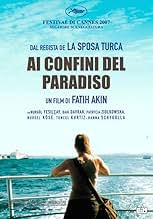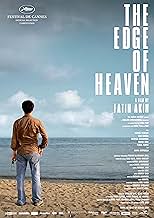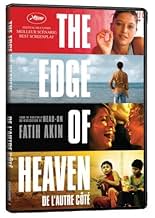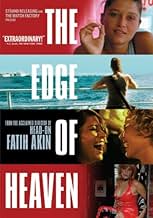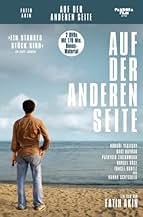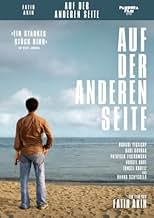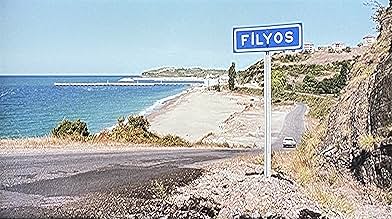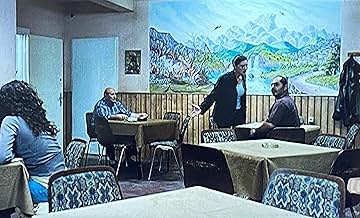NOTE IMDb
7,7/10
35 k
MA NOTE
Un homme turc se rend à Istanbul pour retrouver la fille de l'ex-petite amie de son père.Un homme turc se rend à Istanbul pour retrouver la fille de l'ex-petite amie de son père.Un homme turc se rend à Istanbul pour retrouver la fille de l'ex-petite amie de son père.
- Réalisation
- Scénario
- Casting principal
- Récompenses
- 37 victoires et 22 nominations au total
Avis à la une
With a small scale ensemble cast, The Edge of Heaven examines several themes through the lives of the many characters. Nejat Aksu (Baki Davrak) is a professor of literature in a German university and not happy about his father Ali's new live-in partner Yeter (Nursel Köse), a prostitute who Ali (Tuncel Kurtiz) has hired to stay with him. Yeter has an estranged daughter Ayten (Nurgül Yesilçay) who Nejat decides to track down in Turkey after a tragedy occurs in the family. However, unbeknownst to Yeter and Nejat, Ayten has already traveled to Germany to look for her mother and seek a refugee status as she is a member of a rebellious activist group in Turkey. In Germany she meets a female student Charlotte (Patrycia Ziolkowska) who offers her a place to stay and eventually follows her back to Turkey, much to her mother Susanne's (Hanna Schygulla) chagrin.
The two main story lines (those of Nejat / Yeter and Ayten / Charlotte) are presented after each other in a clear manner but the stories intertwine in many ways, often unnoticed by the characters, creating an extra feel of tragedy – the answer would be so close if only they knew each other! Besides the smaller instances of bad luck, the deaths of major characters are what end up driving the plot forwards, but in the end the message is hopeful; an understanding is what everybody is ultimately seeking.
Akin's calm direction and the good performances throughout easily raise The Edge of Heaven among the best Turkish films I've seen (even though I have only seen a handful). The themes of finding one's true calling in life, the forgiving nature of parent–child relationships and the subpar human rights situation in Turkey are all explored without haste, always maintaining the balance between the different aspects of the story. For anyone who hasn't seen many Turkish films, The Edge of Heaven could be a good starting place, but I imagine it is also worth seeing for those more familiar with the country's cinema.
The two main story lines (those of Nejat / Yeter and Ayten / Charlotte) are presented after each other in a clear manner but the stories intertwine in many ways, often unnoticed by the characters, creating an extra feel of tragedy – the answer would be so close if only they knew each other! Besides the smaller instances of bad luck, the deaths of major characters are what end up driving the plot forwards, but in the end the message is hopeful; an understanding is what everybody is ultimately seeking.
Akin's calm direction and the good performances throughout easily raise The Edge of Heaven among the best Turkish films I've seen (even though I have only seen a handful). The themes of finding one's true calling in life, the forgiving nature of parent–child relationships and the subpar human rights situation in Turkey are all explored without haste, always maintaining the balance between the different aspects of the story. For anyone who hasn't seen many Turkish films, The Edge of Heaven could be a good starting place, but I imagine it is also worth seeing for those more familiar with the country's cinema.
A German filmmaker with Turkish extraction, Faith Akin's fifth feature, a Cannes' BEST SCREENPLAY winner, THE EDGE OF HEAVEN is a Bremen-Istanbul bilateral drama, unfolds in a triptych structure, delineates the vagaries of destiny and incidents impinged upon three parent- offspring pairs: a Turkish professor of German literature Nejat Aksu (Davrak) and his widowed pensioner father Ali (Kurtiz) living in Bremen, the latter, meets a middle-aged Turkish prostitute Yeter (Köse), and decides to pay her to live in with him as his exclusive possession, Yeter misses her daughter Ayten (Yesilçay) in Istanbul, whom she hasn't been in contact for years and later we will learn that she is now a young anti-government firebrand, the final pair is Lotte (Ziolkowska), a German college student who falls in love with Ayten and her mother Susanne (Schygulla), who doesn't quite approve of their lesbian romance and Ayten's radical political stance.
With each of the triptych respectively named as: Yeter's death, Lotte's death, and the eponymous The Edge of Heaven, Akin presages the tragedies in the first two segments like a hanging rock, leaving audience hooked by the impending demise, it is a bold move to dispel suspense and foreground the inevitability in its fair-paced narrative which evinces of Akin's more restrained sobriety over his material and the disparities underlying the two very different countries (both segments opens with protests, one in Bremen, another in Istanbul, their different after-effects tellingly betray Akin's political inclination). But, what renders wholesome of the film's slightly fortuity-heavy story is Akin's reflective and unflinchingly humane dissection of his dramatis personae, they are all the garden-variety type, each tries their best to get hold of their lives in the best possible way, and each is undermined by their foibles, but in its praise of love (Ayten and Lotte's intense love transcends their different mother tongues), family (Yeter's death separates Nejat and Ali, whereas Lotte's death unites Susanne with Ayten), understanding (Susanne's lofty gesture to the girl who obliquely causes the death of her daughter), and forgiveness (the childhood memory prompts Nejat to look for Ali in the end), that finale really vouches for the film's title, heaven is not afar in spite of there is turmoil prevalent on the surface, humanity can prevail.
Wonderful performances from the central sextet, in the (borderline) leading part, Davrak emanates an aura of soothing kindness often outdoes what he is required by the script and Turkish name-star Yesilçay mounts a great deal of rawness and bluntness in her deglamorized commitment, whereas Köse and Ziolkovska, due to their characters' preordained fate, are the ones to proffer ample sympathy. As for the two veterans, the late Turkish triple-threat Kurtiz trades on a spot-on brazenness of senescent loneliness and obstinacy, and Schygulla, staggeringly holds court as the redeeming soul who gets over from a sad bereavement and carries on with a positive vibe, which is so powerful and contagious, that fly-on-the-wall observation of her wailing in the hotel room is tremendously devastating to watch.
After his astounding one-two punch HEAD-ON (2004) and this, in retrospect, the following decade surprisingly hasn't panned out as a substantial acclivity for this wunderkind cineaste (he was only 34 at that time) as one might have postulated, his track record after THE EDGE OF HEAVEN is a lukewarm comedy SOUL KITCHEN (2009), an atrocious misfire THE CUT (2014) and his latest GOODBYE BERLIN (2016), almost gets no traction upon its release in the international front. Will Akin find his mojo back? It will be a crying shame if a filmmaker of his credentials cannot achieve something significantly great.
With each of the triptych respectively named as: Yeter's death, Lotte's death, and the eponymous The Edge of Heaven, Akin presages the tragedies in the first two segments like a hanging rock, leaving audience hooked by the impending demise, it is a bold move to dispel suspense and foreground the inevitability in its fair-paced narrative which evinces of Akin's more restrained sobriety over his material and the disparities underlying the two very different countries (both segments opens with protests, one in Bremen, another in Istanbul, their different after-effects tellingly betray Akin's political inclination). But, what renders wholesome of the film's slightly fortuity-heavy story is Akin's reflective and unflinchingly humane dissection of his dramatis personae, they are all the garden-variety type, each tries their best to get hold of their lives in the best possible way, and each is undermined by their foibles, but in its praise of love (Ayten and Lotte's intense love transcends their different mother tongues), family (Yeter's death separates Nejat and Ali, whereas Lotte's death unites Susanne with Ayten), understanding (Susanne's lofty gesture to the girl who obliquely causes the death of her daughter), and forgiveness (the childhood memory prompts Nejat to look for Ali in the end), that finale really vouches for the film's title, heaven is not afar in spite of there is turmoil prevalent on the surface, humanity can prevail.
Wonderful performances from the central sextet, in the (borderline) leading part, Davrak emanates an aura of soothing kindness often outdoes what he is required by the script and Turkish name-star Yesilçay mounts a great deal of rawness and bluntness in her deglamorized commitment, whereas Köse and Ziolkovska, due to their characters' preordained fate, are the ones to proffer ample sympathy. As for the two veterans, the late Turkish triple-threat Kurtiz trades on a spot-on brazenness of senescent loneliness and obstinacy, and Schygulla, staggeringly holds court as the redeeming soul who gets over from a sad bereavement and carries on with a positive vibe, which is so powerful and contagious, that fly-on-the-wall observation of her wailing in the hotel room is tremendously devastating to watch.
After his astounding one-two punch HEAD-ON (2004) and this, in retrospect, the following decade surprisingly hasn't panned out as a substantial acclivity for this wunderkind cineaste (he was only 34 at that time) as one might have postulated, his track record after THE EDGE OF HEAVEN is a lukewarm comedy SOUL KITCHEN (2009), an atrocious misfire THE CUT (2014) and his latest GOODBYE BERLIN (2016), almost gets no traction upon its release in the international front. Will Akin find his mojo back? It will be a crying shame if a filmmaker of his credentials cannot achieve something significantly great.
The Edge of Heaven
This is such a powerful, expansive, yet intimate movie about one of the things that matters most in our times, it's hard to fault it. The acting, the events, the setting, and implications of all these characters meeting and not quite meeting, suck you in. If it seems to have a lull now and then, you end up feeling the pace of their lives, and the pace of life itself. The events, even when they have a comic twist, are so heady and difficult they could make whole films each by themselves, but here they work through several related sections within a single tapestry.
As strong as the acting is, the core of the movie is the series of events, the plot. You'll see early on some coincidences beyond reason, making the plot almost Shakespearean, and therefore artful. The roles are each character are just a little surprising, just enough to keep us curious, yet each character represents a distinctive aspect of the crosscurrents of German and Turkish cultures and worlds, such as old people assimilating and young people refusing to assimilate. Even more than the mixing of Mexican and American worlds here in the U.S., this is a dramatic and more contentious melding, fraught with all those dangers of misunderstanding we hear in the news every day. Yet when it's brought down to the level of individuals, even seemingly unyielding ones, humanity wins.
I don't know how this film will carry itself in a couple decades. As well made as it is, it feels rooted in the moment, and when the times change yet again, there might be some kind of art or magic or transcendence missing to make it fully transport a viewer. It will remain interesting, but possibly less moving. But then, maybe the themes, of parents and children, of friends looking for who they miss and avoiding who they can't stand any more, might just be universal. But as a reflection of our world right now, 2009 (or 2007, when the movie was finished), it helped clarify just what life is like out there, beyond cinematic glitter and glam, beyond hyped up violence and romance. And beyond even the limitations of documentary in creating aura.
The Edge of Heaven happens to end with such lyrical highs, the name of the movie hits you hard. We are reminded of what exists beyond all the trappings that made so many people in the previous two hours so miserable, and it's there for us to tap into and to have in common, regardless.
This is such a powerful, expansive, yet intimate movie about one of the things that matters most in our times, it's hard to fault it. The acting, the events, the setting, and implications of all these characters meeting and not quite meeting, suck you in. If it seems to have a lull now and then, you end up feeling the pace of their lives, and the pace of life itself. The events, even when they have a comic twist, are so heady and difficult they could make whole films each by themselves, but here they work through several related sections within a single tapestry.
As strong as the acting is, the core of the movie is the series of events, the plot. You'll see early on some coincidences beyond reason, making the plot almost Shakespearean, and therefore artful. The roles are each character are just a little surprising, just enough to keep us curious, yet each character represents a distinctive aspect of the crosscurrents of German and Turkish cultures and worlds, such as old people assimilating and young people refusing to assimilate. Even more than the mixing of Mexican and American worlds here in the U.S., this is a dramatic and more contentious melding, fraught with all those dangers of misunderstanding we hear in the news every day. Yet when it's brought down to the level of individuals, even seemingly unyielding ones, humanity wins.
I don't know how this film will carry itself in a couple decades. As well made as it is, it feels rooted in the moment, and when the times change yet again, there might be some kind of art or magic or transcendence missing to make it fully transport a viewer. It will remain interesting, but possibly less moving. But then, maybe the themes, of parents and children, of friends looking for who they miss and avoiding who they can't stand any more, might just be universal. But as a reflection of our world right now, 2009 (or 2007, when the movie was finished), it helped clarify just what life is like out there, beyond cinematic glitter and glam, beyond hyped up violence and romance. And beyond even the limitations of documentary in creating aura.
The Edge of Heaven happens to end with such lyrical highs, the name of the movie hits you hard. We are reminded of what exists beyond all the trappings that made so many people in the previous two hours so miserable, and it's there for us to tap into and to have in common, regardless.
"The Edge of Heaven", original title "On the other side", takes up a number of ideas from Faith Akin's previous film. But it takes them also in a new unexpected direction - with a political view (on Kurdish problem, on Europeans), with additional protagonist types - now the conflicted German Turks are joined by 'naive' Germans proper and 'seen-too-much' Turkish (Kurds) proper. All of the characters were very well constructed and, as representative types of their social groups, offered much material for the audience to reflect upon.
Indeed, a knowledgeable audience would find this film to be replete with commentary on our social and political reality, the Anatolian and the European, and on the respective preconceptions and stereotypes. Some of the commentary is tragic, some is ironic. Here, in Bulgaria, the audience laughed and applauded when the German granma said with all her conviction to the Kurdish girl that everything in her country will become alright once they join the EU. On the other hand, an émigré Kurdish audience will probably applaud a very moving and full of suspense depiction of the Kurdish struggle in Turkey, which is however frank both to Kurds and to the Turkish authorities. It included small cameos from the conflict that are for the first time openly publicised: for example, the revolutionaries as they are taken out of their hideout to be arrested by the police, announce their names to the street and the world, in apprehension of being disappeared by the authorities; minutes later the crowd of passer-bys claps to the departing police vans in a popular approval of the suppression of kurdish struggle...
Still, the myriad political and social themes are only a setting to a much more personal story. The opening of one's soul, the crossing of inner walls that separate us from those who love us. This story is repeated three times, in different context, for the three characters who remain alive to cross 'to the other side': the German mother who accepts her daughter's ideals, the German-Turkish son who forgives his father, the Kurdish girl who takes the love of her friends over her revolutionary commitment. However, the director allows no one of them to consume their redemption within the film's running time - their characters remain tragic.
It is a very powerful film. As a friend said after the screening, it tramples over you like a steam-roller. The emotional mix of the previous film "Head-on" had me cry, but crying releases the pain. This one doesn't let to release the tension even at the final scene. It will stay with you for days after.
Indeed, a knowledgeable audience would find this film to be replete with commentary on our social and political reality, the Anatolian and the European, and on the respective preconceptions and stereotypes. Some of the commentary is tragic, some is ironic. Here, in Bulgaria, the audience laughed and applauded when the German granma said with all her conviction to the Kurdish girl that everything in her country will become alright once they join the EU. On the other hand, an émigré Kurdish audience will probably applaud a very moving and full of suspense depiction of the Kurdish struggle in Turkey, which is however frank both to Kurds and to the Turkish authorities. It included small cameos from the conflict that are for the first time openly publicised: for example, the revolutionaries as they are taken out of their hideout to be arrested by the police, announce their names to the street and the world, in apprehension of being disappeared by the authorities; minutes later the crowd of passer-bys claps to the departing police vans in a popular approval of the suppression of kurdish struggle...
Still, the myriad political and social themes are only a setting to a much more personal story. The opening of one's soul, the crossing of inner walls that separate us from those who love us. This story is repeated three times, in different context, for the three characters who remain alive to cross 'to the other side': the German mother who accepts her daughter's ideals, the German-Turkish son who forgives his father, the Kurdish girl who takes the love of her friends over her revolutionary commitment. However, the director allows no one of them to consume their redemption within the film's running time - their characters remain tragic.
It is a very powerful film. As a friend said after the screening, it tramples over you like a steam-roller. The emotional mix of the previous film "Head-on" had me cry, but crying releases the pain. This one doesn't let to release the tension even at the final scene. It will stay with you for days after.
Faith Akin, renowned for his energetic movie 'Gegen die Wand', brings another story about the Turkish-German community. The movie focuses on three families who are all connected in some way. In a beautiful way Akin shows the struggle of a Turkish prostitute, a professor of German literature, a young Turkish rebel, a student English and Spanish and a retired widower to find peace and happiness in their lives. Akin manages to avoid the many pitfalls which can lead to clichés. The characters remain just ordinary people with genuine emotions and problems. The movie also depicts the impact of globalization and multiculturalism in nowadays Germany and Turkey. It's the most debated topic of our time. To what extent do we want newcomers to adapt to their new surroundings and to what extent do we accept them to cherish their own cultural heritage. In an even broader perspective, it deals with the clash between the Islamic and western world. 'Auf der anderen Seite', which means on the other side, shows how Turkish immigrants come to love their new country, Germany, without losing their Turkish roots. I think Akin invites us to try and imagine the backgrounds of people, so there will be less misunderstanding. This view is symbolized by Lotte, a German student, who decides to help Ayten, a Turkish political activist who fled Turkey. She doesn't know the Turkish girl but just wants to help her, because the girl has nowhere to go. This quest even brings her to the shores of Istanbul, a city where East meets West in the most literal way.
In the end, 'Auf der anderen Seite' is a story of love and hope which is most endearing and sheds a refreshing light on the global trend of clashing cultures. Any one who is interested in these topics and just loves a very well made movie, ought see this German-Turkish production!
In the end, 'Auf der anderen Seite' is a story of love and hope which is most endearing and sheds a refreshing light on the global trend of clashing cultures. Any one who is interested in these topics and just loves a very well made movie, ought see this German-Turkish production!
Le saviez-vous
- AnecdotesNurgül Yesilçay - who is a big star in her native Turkey - had doubts about taking on the part of Ayten as she wasn't sure how audiences would react to seeing her as a revolutionary lesbian.
- GaffesIn the film, the year is 2006 and it is the Festival of Sacrifices (Kurban Bayrami), a religious holiday. Everybody is in summer clothes and many of them are sweating. The Festival of Sacrifices in 2006 in Turkey was in winter, at the end of December.
- Citations
story: After telling the story of Abraham that was willing to sacrifice his son, Ismael, to show God his obedience. Before Abraham could slay his son God sent a lamb to sacrifice instead.
Nejat Aksu: I asked my dad if he would have sacrificed me as well.
Susanne Staub: And what did he say?
Nejat Aksu: That he would even make an enemy of God to protect me.
- Crédits fousThe film's title appears twice: in the middle of the film at 1 hour 25 mins and after the end credits.
- ConnexionsFeatured in Fatih Akin - Tagebuch eines Filmreisenden (2007)
Meilleurs choix
Connectez-vous pour évaluer et suivre la liste de favoris afin de recevoir des recommandations personnalisées
- How long is The Edge of Heaven?Alimenté par Alexa
Détails
- Date de sortie
- Pays d’origine
- Sites officiels
- Langues
- Aussi connu sous le nom de
- The Edge of Heaven
- Lieux de tournage
- Sociétés de production
- Voir plus de crédits d'entreprise sur IMDbPro
Box-office
- Montant brut aux États-Unis et au Canada
- 742 349 $US
- Week-end de sortie aux États-Unis et au Canada
- 14 257 $US
- 25 mai 2008
- Montant brut mondial
- 17 804 565 $US
- Durée
- 1h 56min(116 min)
- Couleur
- Mixage
- Rapport de forme
- 1.85 : 1
Contribuer à cette page
Suggérer une modification ou ajouter du contenu manquant


